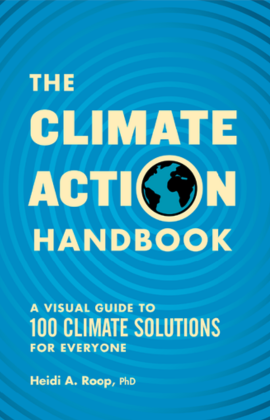Dr. Heidi Roop is the Director of the University of Minnesota Climate Adaptation Partnership and an Assistant Professor of Climate Science and Extension Specialist at the University of Minnesota. Her research and Extension programs combine cutting-edge climate science and effective science communication to increase the use and integration of climate change information in decision-making at a range of scales—from city and state to national and international levels. Her climate science research takes her around the world from Antarctica to California to the shores of Lake Superior. In addition to her appointments at the University of Minnesota, she also is an Affiliate Assistant Professor in the School of Public Health at the University of Washington and serves as expert advisor to a range of organizations and agencies as they seek to build resilience to climate change.
About The Climate Action Handbook
As more focus is put on climate science, there is a need for each of us to learn how we can change our habits in our home, communities, and government to save our planet. Enter The Climate Action Handbook.
A visually stunning guide, it does what no other climate change book manages to do: it’s approachable, digestible, and offers the average person ideas, options, and a roadmap for action. It also offers hope—often overlooked in climate change conversations. Climate actions can create near-instantaneous improvements in air quality and can offer ways to address societal inequities, green our communities, save money, and build local economies. Stunning and creative infographics help anyone easily grasp the many challenges facing our planet, as well as how every action—be it on the individual, local, or government level—matters.
From food and fashion choices, rethinking travel, greening up our homes and gardens, to civic engagement and championing community climate planning, Dr. Heidi Roop shares 100 wide-ranging ways that readers from all walks of life can help move the needle in the right direction.
Actions include:
• Cutting down on food waste
• Reducing your driving speed
• Voting in every election
• Using the cold-water cycle on your washing machine
• Supporting healthy soils in your gardens and community green spaces
• Engaging in local climate action planning
• Preparing an emergency kit for your home
• Deleting unused emails and online accounts
• Swapping out milk for nondairy alternatives like oat milk
• Opting for slower shipping whenever possible
• Regularly maintaining and clean your heating and cooling systems
• Engaging in climate conversations at work and at home
And many more!


